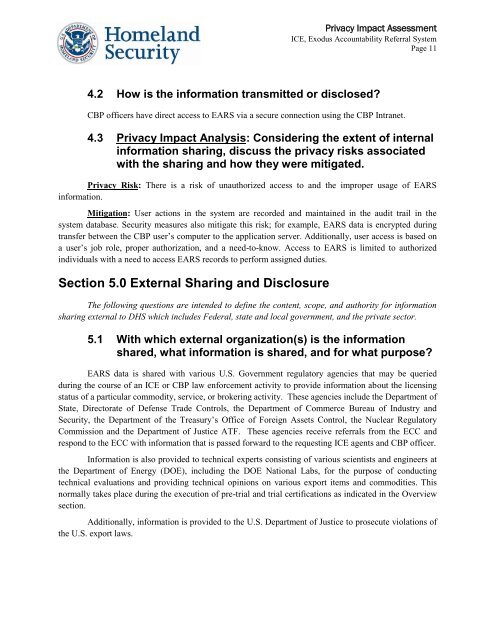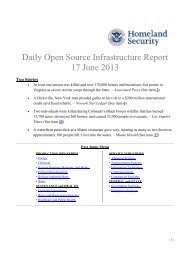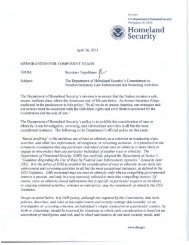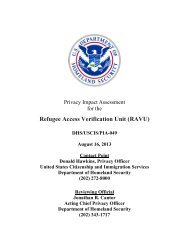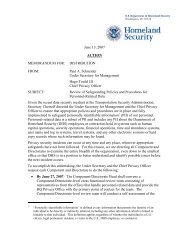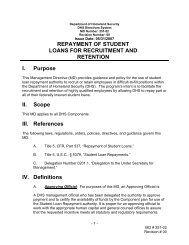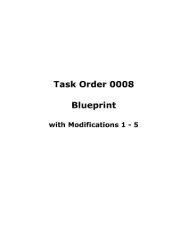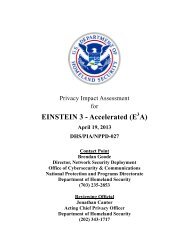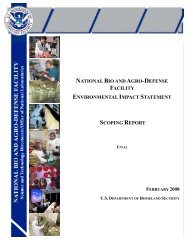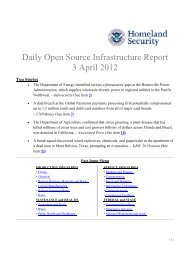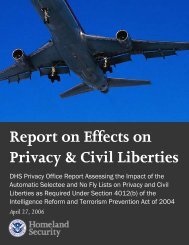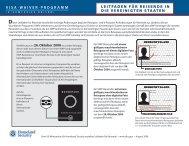Exodus Accountability Referral System (EARS) - Homeland Security
Exodus Accountability Referral System (EARS) - Homeland Security
Exodus Accountability Referral System (EARS) - Homeland Security
Create successful ePaper yourself
Turn your PDF publications into a flip-book with our unique Google optimized e-Paper software.
Privacy Impact Assessment<br />
ICE, <strong>Exodus</strong> <strong>Accountability</strong> <strong>Referral</strong> <strong>System</strong><br />
Page 11<br />
4.2 How is the information transmitted or disclosed?<br />
CBP officers have direct access to <strong>EARS</strong> via a secure connection using the CBP Intranet.<br />
4.3 Privacy Impact Analysis: Considering the extent of internal<br />
information sharing, discuss the privacy risks associated<br />
with the sharing and how they were mitigated.<br />
Privacy Risk: There is a risk of unauthorized access to and the improper usage of <strong>EARS</strong><br />
information.<br />
Mitigation: User actions in the system are recorded and maintained in the audit trail in the<br />
system database. <strong>Security</strong> measures also mitigate this risk; for example, <strong>EARS</strong> data is encrypted during<br />
transfer between the CBP user’s computer to the application server. Additionally, user access is based on<br />
a user’s job role, proper authorization, and a need-to-know. Access to <strong>EARS</strong> is limited to authorized<br />
individuals with a need to access <strong>EARS</strong> records to perform assigned duties.<br />
Section 5.0 External Sharing and Disclosure<br />
The following questions are intended to define the content, scope, and authority for information<br />
sharing external to DHS which includes Federal, state and local government, and the private sector.<br />
5.1 With which external organization(s) is the information<br />
shared, what information is shared, and for what purpose?<br />
<strong>EARS</strong> data is shared with various U.S. Government regulatory agencies that may be queried<br />
during the course of an ICE or CBP law enforcement activity to provide information about the licensing<br />
status of a particular commodity, service, or brokering activity. These agencies include the Department of<br />
State, Directorate of Defense Trade Controls, the Department of Commerce Bureau of Industry and<br />
<strong>Security</strong>, the Department of the Treasury’s Office of Foreign Assets Control, the Nuclear Regulatory<br />
Commission and the Department of Justice ATF. These agencies receive referrals from the ECC and<br />
respond to the ECC with information that is passed forward to the requesting ICE agents and CBP officer.<br />
Information is also provided to technical experts consisting of various scientists and engineers at<br />
the Department of Energy (DOE), including the DOE National Labs, for the purpose of conducting<br />
technical evaluations and providing technical opinions on various export items and commodities. This<br />
normally takes place during the execution of pre-trial and trial certifications as indicated in the Overview<br />
section.<br />
Additionally, information is provided to the U.S. Department of Justice to prosecute violations of<br />
the U.S. export laws.


